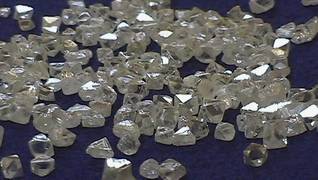
Guests
- Charmian Goochfunder and director of Global Witness, on the line from London.
For more on the diamond industry, we’re joined by Global Witness founder and director Charmian Gooch. Gooch says diamond companies have failed to deliver on promises to reduce the prevalence of blood diamonds. [includes rush transcript]
We invited a representative of the World Diamond Council to join us, as well, but they never responded to our invitation.
Transcript
AMY GOODMAN: Right now, we’re going to turn to Charmian Gooch in London, who is with Global Witness. Welcome to Democracy Now!, Charmian. And in this last two minutes, can you update us? The documentary we ran was from 2000 about conflict diamonds, about the civil war in Sierra Leone. What is happening today?
CHARMIAN GOOCH: Well, hello, and it’s very nice to get the chance to talk about some of these issues, so thanks for inviting me on. Well, I mean, the issue — the problem really is, is that although worldwide, particularly in Africa, conflicts have decreased, which is obviously a very, very good thing, there are still conflict diamonds out there, as noted by the United Nations, coming out of the Ivory Coast. And diamonds, you know, in the last —- we’re talking very recently, we’re talking the late ’90s, mid—’90s, late ’90s, and, you know, the early stage of this — early — 1999, 2000, 2001, 2002, large quantities of conflict diamonds, these blood diamonds, were getting into the trade. The diamond industry, as a whole, was doing nothing. It had to be the civil society, the campaigning organizations that protested, and there was a global campaign about this.
That led to governments around the world putting together a broad-brush process called the Kimberley Process, which is broad-brush import and export. And the industry has all promised that it would put something meaningful in place in parallel. And it has failed to do so completely.
And this is our big concern. You know, Global Witness has been working on this, we launched the whole issue and the whole campaign and directed the world’s attention back in 1998. And since then, we have been working with other groups around the world to try and really push for changes to this. And that’s why Global Witness and Amnesty have been raising concerns around Valentine’s Day, which is traditionally one of the biggest sales points in the year for diamonds and diamond jewelry, just to say to consumers, you know, “You have some power here. You can take action.” There’s a set of four really simple questions that you can ask, and you can do something about this, because the industry on its own is absolutely failing, as a whole, to live up to its promises.
AMY GOODMAN: What are the four simple questions?
CHARMIAN GOOCH: Four simple questions. When you go into a jewelry store, if you really want to buy a diamond, the four questions are: Do you know where your diamonds come from? Can I see a copy of your company’s policy on conflict diamonds? Can you show me a written guarantee from your diamond suppliers that states your diamonds are conflict-free? And, fourthly, how can I be sure that none of your jewelry contains conflict diamonds?
Now, that’s a lot — I know, that’s quite a lot there. If anyone wants to, they can have a look at the globalwitness.org website or the Amnesty International website. There’s a leaflet there they can print out that’s got all that information in it.
AMY GOODMAN: And we will link to that. Charmian Gooch, I want to thank you for being with us, co-founder and director of Global Witness, on the line with us from London. Happy Valentine’s Day.
CHARMIAN GOOCH: Thank you. Bye-bye.












Media Options